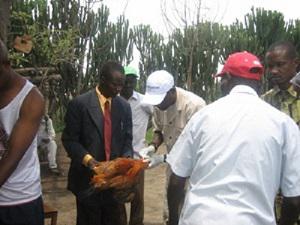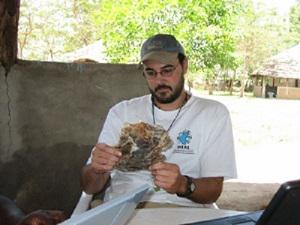Dennis Rentsch
The aims of this project are to
1) assess the nature of demand for bushmeat by local communities living in the Serengeti ecosystem, specifically with regard to socio-economic and nutritional motivations for consuming bushmeat, and
2) to determine the viability of poultry as an alternative to bushmeat and to determine whether improving poultry production by vaccinating against Newcastle disease will help reduce bushmeat hunting.

Illegal hunting of wildlife by communities around Serengeti ecosystem is having a severe impact on migratory and non-migratory wildlife populations. Bushmeat hunting is considered by conservationists to be unsustainable at current levels and one of the most serious threats to wildlife in Africa. A significant proportion of illegal hunting in this area consists of subsistence bushmeat hunting and is attributed primarily to a lack of sufficient alternative sources of protein and income. As human populations continue to grow exponentially in villages bordering protected wildlife areas, the impact on wildlife grows as well.

Studying bushmeat.
Previous efforts to reduce illegal poaching relied heavily on enforcement techniques; anti-poaching patrols carried out under protected area managers. However, this enforcement addresses the symptom without considering the nature of demand for bushmeat. In order to direct mitigation efforts, it is essential to understand the role of bushmeat to local communities. Bushmeat hunting serves as an important source of food and of income to communities adjacent to Serengeti National Park. Previous studies as well as preliminary data collected in 2006 suggest that bushmeat hunting is motivated by poverty due to lack of adequate food and income sources.
Perhaps the best way to mitigate bushmeat hunting is to combine existing law enforcement efforts with strategies that reduce demand for bushmeat by providing alternative sources of food and income. One approach to reduce bushmeat hunting and its consequent threat to conservation is to improve the ability of people to subsist on alternative sources of protein. Therefore, strategically targeted small-scale livestock development programs might help mitigate bushmeat hunting in this area. By helping to provide alternative food and income sources to people living near protected areas, it may be possible to curb local demand for bushmeat.
My research seeks to first understand the role of bushmeat hunting as it relates to poverty in the Western Serengeti ecosystem, and use this understanding to direct potential mitigation programs. The long-term scope of this study explores one such initiative – a program to improve the health and production of local chickens by vaccinating against Newcastle disease - and the subsequent effect on bushmeat hunting. My hypotheses for this mitigation initiative are:
1) villages with higher poultry production have better access to protein and increased income;
2) villages with improved poultry production consume less bushmeat.
Initial analyses suggest that this is a viable strategy to address the driving forces behind bushmeat consumption.